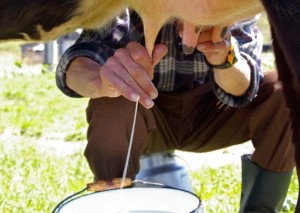As the state of Indiana considers making raw milk legal to sell, Purdue University Extension has published a Raw Milk Fact Sheet. The document, written by Mike Schutz, Extension Dairy Specialist, and Mike Ferree, Agriculture and Natural Resources Educator, details the history of raw milk in Indiana and answers common questions about the product.
Pasteurization drastically reduces the pathogenic bacteria that can be present in raw milk, including Mycobacterium tuberculosis, Brucella melitensis, Coxiella rickettsia (Q-fever), Salmonella, Yersinia, Toxoplasma, E. coli 0157:H7, Campylobacter, Listeria monocytogenes, Cryptosporidia, Staphylococcus and Streptococcus.
 Milk is altered by pasteurization, but that does not degrade its health benefits. Most enzymes retain their activity, protein is largely unaffected by pasteurization, and bacterocins and oligosacharides are both heat stable so are unaffected.
Milk is altered by pasteurization, but that does not degrade its health benefits. Most enzymes retain their activity, protein is largely unaffected by pasteurization, and bacterocins and oligosacharides are both heat stable so are unaffected.
The Fact Sheet also states that “most of the time risks from consumption of unpasteurized milk are not great, but the health consequences if one contracts the disease can be very serious, or even fatal.” Attorney Fred Pritzker has likened drinking raw milk to not wearing a seatbelt. “Most people do not get into car accidents. But if you do and you are not wearing a seatbelt, the results are more likely to be catastrophic.”
Environmental factors that can influence contamination can vary greatly from farm to farm and week to week on any given farm. When asked about farm children who grew up drinking raw milk, the authors state, “raw milk tends to be consumed more quickly on the farm and therefore provides less incubation time for bacteria. … A sudden occurrence of new pathogenic bacteria may still result in disease. In one 2012 E. coli 0157:H7 outbreak in Oregon, among the 21 individuals who took ill were four children from the farm on which the milk was produced.” Four of the children in that outbreak were hospitalized with hemolytic uremic syndrome that caused kidney failure.
The authors also state that while there have been many claims about the benefits of unpasteurized milk, they are not backed by peer-reviewed, controlled studies. The European GABRIELA study found that farm children who consume raw milk have fewer cases of asthma and hay fever, but the study did not control other factors that may affect allergy development, such as animal exposure. And the study did not compare the reduction of allergy incidence versus the inherent risk of consuming raw milk.
Purdue’s stance is that pasteurization is the best way to ensure the safety of milk products. If the legislature makes sales of raw milk legal, “renewed focus should be on educating consumers about pasteurization; the very real disease risks of consuming unpasteurized milk; and how to properly handle milk, whether pasteurized or not.”




